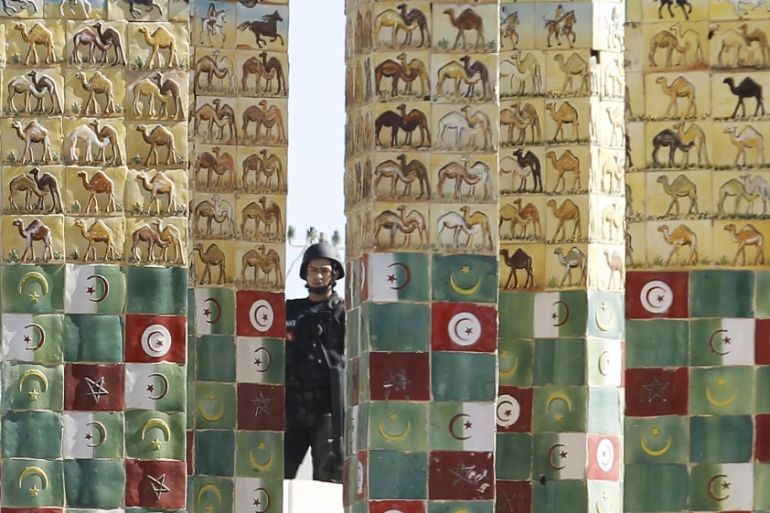Tunisia: A revolution besieged by ISIL
Addressing the socio-economic question is crucial to Tunisia’s long and arduous battle against ISIL terrorism.

In the hours following the deadly attack by the Islamic State of Iraq and the Levant group on Ben Gardane in which 55 people were,Tunisians reacted with a sense of foreboding about the country’s “revolution” that verged on the histrionic.
As a Tunisian professor at the University of Gafsa said: “With each [ISIL] attack, our revolution is being atrociously targeted with dreadful turns and twists, and images of our old and/or incompetent leaders are oozing with fears and tears …”
Keep reading
list of 4 itemsMoscow theatre attack suspects show signs of beating in court
Four men showing signs of severe beating charged over Moscow concert attack
Russia mourns Moscow concert hall attack victims as death toll rises to 137
Many Tunisians echo the sentiments, lamenting the absence of a decisive vision and sensible plans to keep ISIL at bay.
Following ISIL’s fourth deadliest attack of the year, the country has become increasingly concerned both about the fate of its revolution and the violence spilling across its frontier as the armed group has expanded in Libya, taking advantage of the chaos there to set up training camps.
An adviser to former Prime Minister Hammadi Jebali pointed out that “our revolution has become so suspenseful that its fate is now being decided by a rag-tag militia – ISIL – through seemingly porous borders all over Tunisia.”
This growing perception of the revolution’s “continuous” fall from the peak of triumph is threatening to become the defining heart of Tunisia’s own narrative of the Arab Spring.
READ MORE: Tunisia – why foreign fighters abandon ISIL
On Monday, dozens of ISIL fighters stormed the border town of Ben Gardane attacking army and police posts and triggering street battles during which troops killed 36 fighters. Twelve soldiers and seven civilians also died. Tunisia’s prime minister confirmed on Tuesday that ISIL had carried out the raid to win control of the town and expand its territory.
A number of factors have placed Tunisia – and its revolution – under a state of siege. Increased terrorist activity – especially by ISIL – is bleeding the economy dry of tourism revenues, a key source of national income.
|
The latest attack, however, is a dangerous escalation that Tunisia would need to fight with more than just guns. |
Regional factors are also at play. A history professor from the University of Tunis succinctly observes that “the success of Tunisia’s democratising debut worries some regional powers”.
On the domestic front, the economic hardship has in turn caused large-scale popular unrest especially in the south and the central Tunisia.
This internal dynamic has further hurt Tunisia by creating a kind of a ready-made “fodder” for unrest – “guns for hire”: Tunisian young men are the most prone to joining ISIL. The country has a social stratum that is politically and economically on the margins and is vulnerable to radicalisation.
The number of Tunisians fighting in Syria and Iraq, including returnees, is put at more than 5,000 by some Tunisian security specialists.
This downturn in economic performance has been devastating, wiping out family livelihoods in tourist areas with the loss of employment opportunites among the young. If this trend continues, Tunisia will end up either recovering from, or bracing itself for, future ISIL attacks while working to contain the damage inflicted on the modest economy.
To make things worse, the country’s leadership offers no survival strategies to ease this state of siege. Rhetoric alone no longer appeases the people who are incessantly told “to be patient”.
It is not, however, all doom and gloom.
A supporter of the Ennahda, Tunisia’s Islamist party, reasons that patience is a virtue. The way, he puts it, is that “our revolution is not a leaf-less tree … it has embellished our lives with a democratic constitution, alternation of power, free and fair elections, independent judiciary, licensed parties, free trade unions, free speech and more equality than in many Arab states.”
His argument is that the ISIL attacks, now more frequent and more deadly, strewn all along the tiny country from Tunis in the north (Bardo attack) to Ben Gardane in the south, are no more than “distractions” from the institution-building process.
READ MORE: Tunisia’s social timebomb
|
|
Tunisia may be a good case study of democratic transition, but it is one that is weighed down by a “failed” economy.
Moreover, ISIL’s emerging tactic is to focus on Tunisia as the weakest link in the security chain in North Africa. These kind of attacks are taking place in neighbouring Algeria and Libya. The first two attacks in 2015 targeted tourism: the Bardo National Museum in Tunis on March 18, and on the beach resort of Port El-Kantaoui, in Sousse, on June 26, 2015.
Of late, the trend has been to hit symbols of state using suicide bombing, which is more difficult to detect and deter than armed militias.
ISIL’s bombing of a bus carrying members of the presidential guard last November exemplifies this trend and the attack on Ben Gardane follows logically from that attack. They will keep coming.
The latest attack, however, is a dangerous escalation that Tunisia will need to fight with more than just guns.
Addressing the socio-economic question is crucial in the long and arduous battle against the complicated terrorist phenomenon that ISIL, with its solidified presence in Libya, may be only one manifestation.